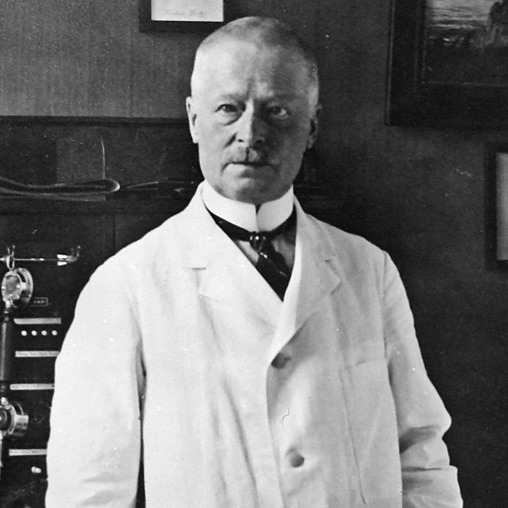- Surname:
- Simon
- First name:
- Hermann
- Era:
- 19th century
20th century - Field of expertise:
- Psychiatry
- Place of birth:
- Zweibrücken (DEU)
- * 22.03.1867
- † 14.11.1947

Simon, Hermann
German psychiatrist, founder of systematic work therapy.
Hermann Simon (1867-1947) was born in Zweibrücken in the Palatinate. Following his school education and military service, he studied medicine in Munich, Berlin and Strasbourg. He completed his studies in 1891, worked as an assistant physician at the district asylum in Saargemünd (today Sarreguemines, France) and was appointed senior physician at the provincial asylum Dortmund-Aplerbeck in 1896. He received his doctorate from the University of Strasbourg in 1898 for his study Ein Beitrag zur Kenntnis der Militärpsychosen (A Contribution to the Understanding of Military Psychoses, published in 1901). He became senior physician in Lengerich in 1902 and director of the newly established mental institution in Warstein in 1905. In 1914, he assumed the post of medical director at the new provincial asylum in Gütersloh, then still under construction. After his military service during WWI, he returned to Gütersloh where the new institution was finally opened in 1919.
Activating treatment
Simon is considered the founder of modern psychiatric work therapy: treatment should stimulate and strengthen the patients’ remaining resources instead of merely “warehousing” the mentally ill in a state of passivity. He had already noticed the positive effects of work assignments within the clinic premises while director in Warstein. Later, in the Weimar Republic, he supported the concept of open or outpatient care (“offene Fürsorge”) developed by Gustav Kolb and Friedrich Wendenburg. In Gütersloh, he introduced a five-level performance and incentive system. Each new patient was assigned simple tasks, and visible improvements were rewarded with ever more demanding assignments. The top level involved (unpaid) manual, domestic or farm work outside the clinic. Individual performance and usefulness were the benchmark of successful rehabilitation (cf. Simon 1931). This paternalistic top-down approach dominated the entire day-to-day life at the institution but did not reduce the length of patients’ stays. However, the Gütersloh model differed significantly from other clinics’ practice of simply warehousing their patients. During the second half of the 1920s, the institution attracted numerous visitors from all over Germany and beyond.
During the Nazi era
Towards the end of the 1920s, Simon, a left liberal in the early Weimar Republic, increasingly approved of eugenic measures on grounds of a social Darwinist conception of human development. In a lecture for theologians held in 1931, he pointed out: “It seems that there again will have to be dying. The only question is who will have to die in their millions. Death is and always also will be a relief. Even the Church is now beginning to realise that giving too much consideration to the weak and diseased is an atrocity against the healthy and hardworking ones ...” (quoted after Walter 2002: 1053; our translation). Simon applied for NSDAP membership in 1933, but his status of candidacy was revoked due to conflicts with the party’s local branch. He was actively involved in the German Association for Mental Hygiene and its Nazi successor organisation, the German Association for Mental and Racial Hygiene. He demanded, for instance, that the Association’s “code of eugenic practice” be tightened in accordance with the Law for the Prevention of Hereditarily Diseased Offspring (Plezko 2011: 29 f.). Hermann Simon retired in 1934 and died in November 1947 in Gütersloh.
Simon’s therapeutic approaches received revived interest in the wake of the psychiatric reform in Germany in the 1970s and 1980s. However, his obvious approval of eugenic measures – even prior to the Nazis’ rise to power – raised some controversy among the expert public in the late 1990s (Kersting 2018; Jauchertz 2008). Consequently, the German Association for Psychiatry, Psychotherapy and Psychosomatics abolished its Hermann Simon Prize in 2009, and the Warstein clinic renamed its former Hermann Simon Institute in 2012.
Literature
Beddies, T. (2013): „Aktivere Krankenbehandlung “und „Arbeitstherapie “. Anwendungsformen und Begründungszusammenhänge bei Hermann Simon und Carl Schneider. H.-W. Schmuhl, V. Roelcke (Hg.): „Heroische Therapien “. Die deutsche Psychiatrie im internationalen Vergleich, 1918-1945, Göttingen: Wallstein Verlag, pp. 268-286.
Grütter, A. (1995): Hermann Simon. Die Entwicklung der Arbeits- und Beschäftigungstherapie in der Anstaltspsychiatrie – Eine biographische Betrachtung. Herzogenrath: Murkken-Altrogge.
Jauchertz, N. (2008): Randnotiz: Simons Doppelgesicht. In: Deutsches Ärzteblatt 105, (47), pp. A 2498.
Kersting, F.-W. (2018): Der Psychiater Herrmenn Simon im erinnerungskulturellen Kontext. In: M. Freese, M. Weidner (Hg.): Verhandelte Erinnerungen. Paderborn: Schönigh, S. 209-229.
Payk, T. R. (2003): Hermann Simon: Aktiver Therapeut und überzeugter Sozialdarwinist. In: Krankenhauspsychiatrie 14, (2), pp. 67-72.
Plezko, A. (2011): Handlungsspielräume und Zwänge in der Medizin im Nationalsozialismus: Das Leben und Werk des Psychiaters Dr. Hans Roemer (1878-1947). Inauguraldissertation zur Erlangung des Grades eines Doktors der Zahnmedizin des Fachbereichs Medizin der Justus-Liebig-Universität Gießen.
Schulte, W. (1959): Hermann Simon, 1867-1947. In: K. Kolle (ed.): Große Nervenärzte. Vol. 2. Stuttgart: Thieme, pp. 225-235.
Simon, H. (1938): Ergebnisse einer aktiveren Krankenbehandlung in der Heil-und Pflegeanstalt. In: Deutsche Medizinische Wochenschrift 64, (34), pp. 1224-1227.
Simon, H. (1931): Beschäftigungsbehandlung. In: O. Bumke, G. Kolb, H. Roemer, E. Kahn, (eds.): Handwörterbuch der psychischen Hygiene und der psychiatrischen Fürsorge. Leipzig: De Gruyter, pp. 108-113.
Simon, H. (1929): Aktivere Krankenbehandlung in der Irrenanstalt. Berlin, Leipzig: De Gruyter.
Simon, H. (1901): Ein Beitrag zur Kenntnis der Militärpsychosen. Leipzig: G. Fock.
Walter, B. (2002): Hermann Simon – Psychiatriereformer, Sozialdarwinist, Nationalist? In: Der Nervenarzt 73, (11) pp. 1047-1054.
Walter, B. (1996): Psychiatrie und Gesellschaft in der Moderne. Geisteskrankenfürsorge in der Provinz Westfalen zwischen Kaiserreich und NS-Regime. Paderborn: Schöningh.
Burkhart Brückner, Ansgar Fabri
Photo: unknown / Source: Wikimedia / [public domain].
Referencing format
Burkhart Brückner, Ansgar Fabri (2015):
Simon, Hermann.
In: Biographisches Archiv der Psychiatrie.
URL:
www.biapsy.de/index.php/en/9-biographien-a-z/177-hermann-simon-e
(retrieved on:21.08.2025)
